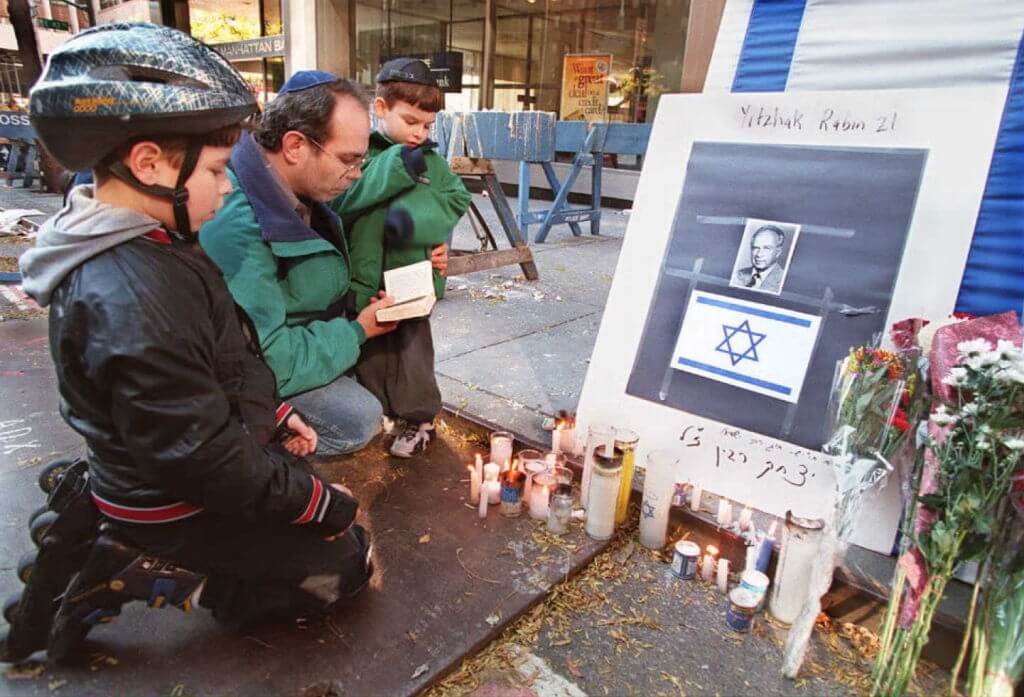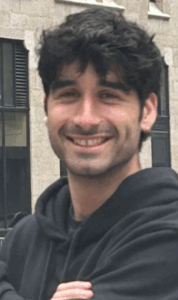Could poetry revive Yitzhak Rabin’s legacy among young American Jews?
Barak Sella hopes his new English translation of ‘Class of 95’, Israel’s first poetry anthology about Rabin’s murder, introduces the slain leader to a younger, American crowd

Robert Marx leads his sons Joshua and Benjamin in prayer next to a makeshift memorial to Israeli Prime Minister Yitzhak Rabin, in front of the Israeli consulate in New York on Nov. 5, 1995. Photo by Bob Strong/AFP via Getty Images
Perhaps the most enduring phrase from the period following Yitzhak Rabin’s assassination, 30 years ago this week, was then-President Bill Clinton’s valediction for his slain friend: “Shalom, haver” — goodbye, friend. It exemplified not just the genuine kinship between Clinton and Rabin, one amiable and telegenic, the other awkward and camera-shy, but also the ironclad bond between Israel and the United States.
Today, however, the so-called special relationship is under considerable duress — not least because generations of younger American Jews are increasingly suspicious of Zionism. And Rabin? He’s at risk of being forgotten altogether in the US, said Barak Sella, editor of Class of 95, a new English translation of an Israeli poetry anthology about Rabin’s murder and legacy.
Sella, who was born in Texas but came to Israel in 1994 when he was 10, was part of a generation of Israeli schoolchildren for whom Rabin’s death in November 1995 loomed impossibly large. “It was my moment of political awakening,” he said. “The first event I went to at my youth movement was a Rabin memorial ceremony. So for me, the assassination ran parallel to my socialization into Israeli society.”
In 2013, Dror L’Nefesh, the printing press of the Habonim Dror Youth movement to which Sella belonged — he was by this point also a well-established activist and community organizer — published the anthology in Hebrew under the title Machzor 95. Its publication was something of a happy accident: The movement had wanted to do something literary to mark the 18th anniversary of Rabin’s passing, Sella recalled, “but we couldn’t find any poetry or literature about it — only op-eds and articles.” When they put out an open call for contributors, the response was so overwhelming they had enough material to produce Israel’s first poetry anthology dedicated to Rabin’s passing.
The title was a pun of sorts, for in Hebrew Machzor has both a colloquial meaning — class, or generation — and a liturgical one: a Machzor is a prayer book for Jewish holidays. The aim was “to create a tradition of memory that was cyclical,” Sella said, “to create an artifact you can return to year after year.”
By 2022, when a second Hebrew-language edition was published, Sella was already toying with the idea of putting together an English version, as he’d always seen Rabin’s assassination “not as an Israeli event, but as a Jewish event.” Indeed, in 1995, much of American Jewry had mourned Rabin intensely. “It was everything American Jews talked about,” Sella said. “One of the largest ever Jewish gatherings was for Rabin’s shloshim in Madison Square Garden.” (On Dec. 11, 1995, a crowd of more than 15,000 packed the New York arena to mark thirty days, shloshim in Hebrew, since Rabin’s death.)
But Rabin’s legacy faded from view, Sella believed, because Israel itself could not agree on what he represented. “Israel is still so deeply divided about this,” he said. “So it’s very hard to expect American Jews to create some kind of shared culture around Rabin’s memory.”
That’s where the translated anthology comes in, which Sella hopes will serve “as an education tool,” something “teachers and rabbis who want to talk to their community about the assassination can pick up, choose a poem or two, and invite people into a conversation.”
The anthology is at once a guide to the assassination and a window into how Israeli society responded. One poem, Shachar-Mario Mordechai’s ‘Before the Government of Israel Announces With Astonishment’, invokes the official announcement of Rabin’s death. Another, ‘Blank’, by Raanan Ben Tovim, explores the claim, never substantiated, that immediately after the shots rang out somebody shouted “srak, srak” (in English, blank) a phrase that, among Israelis, has become a shorthand for Rabin’s murder — and has fueled conspiracy theories ever since.
Sella’s vision for the anthology is decidedly long-term. “This translation is not only for the thirty-year anniversary,” he said. “I’m thinking about, you know, in 50 years, in 100 years, what are the artifacts of our time that will assist not only the current generation, but also future ones, to build a story, to understand, and to reflect?”
The translation is therefore aimed especially at younger American Jews. “The people who will carry this memory forward are not going to be those who were at the square,” Sella said. He still firmly believes Rabin can be a “symbol for overcoming our differences, for shared destiny and democracy.” In short, American Jews would do well to recall not simply that Yitzhak Rabin was killed, but, no less important, the ideals he died for.
















